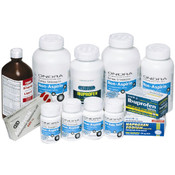Vitamin D deficiency may also result from inadequate intake, reduced absorption, impaired or abnormal metabolism or resistance to the effects of vitamin D.
Deficiency of vitamin D is preventable with adequate nutritional intake with nutritional and dietary supplements or by exposure to sunlight. Unfortunately, both dietary intake of vitamin D (other than with supplements) and exposure to sunlight continue decline. Research shows that this especially noticeable with exclusively breastfed infants and infants with darker skin pigmentation in the United States and other Western countries.
Based on recent research The American Academy of Pediatrics (141 Northwest Point Blvd, Elk Grove Village, IL 60007, phone 847 434 4000, http://aap.org) is doubling the amount of vitamin D it recommends for infants, children and adolescents. The new clinical report, "Prevention of Rickets and Vitamin D Deficiency in Infants, Children, and Adolescents," recommends all children receive 400 IU a day of vitamin D, beginning in the first few days of life. The previous recommendation, issued in 2003, called for 200 IU per day beginning in the first two months of life.
The change in recommendation comes after reviewing new clinical trials on vitamin D and the historical precedence of safely giving 400 IU per day to the pediatric population. Clinical data show that 400 units of vitamin D a day will not only prevent rickets, but treat it. This bone-softening disease is preventable with adequate vitamin D, but dietary sources of vitamin D are limited, and it is difficult to determine a safe amount of sunlight exposure to synthesize vitamin D in a given individual. Rickets continues to be reported in the United States in infants and adolescents. The greatest risk for rickets is in exclusively breastfed infants who are not supplemented with 400 IU of vitamin D a day.
Adequate vitamin D throughout childhood may reduce the risk of osteoporosis. In adults, new evidence suggests that vitamin D plays a role in the immune system and may help prevent infections, autoimmune diseases, cancer and diabetes.
"We are doubling the recommended amount of vitamin D children need each day because evidence has shown this could have life-long health benefits," said Frank Greer, MD, FAAP, chair of The American Academy of Pediatrics (AAP) Committee on Nutrition and co-author of the report. “Supplementation is important because most children will not get enough vitamin D through diet alone.”
"Breastfeeding is the best source of nutrition for infants. However, because of vitamin D deficiencies in the maternal diet, which affect the vitamin D in a mother’s milk, it is important that breastfed infants receive supplements of vitamin D,” said Carol Wagner, MD, FAAP, member of the AAP Section on Breastfeeding Executive Committee and co-author of the report. “Until it is determined what the vitamin D requirements of the lactating mother-infant dyad are, we must ensure that the breastfeeding infant receives an adequate supply of vitamin D through a supplement of 400 IU per day.”
The new recommendations include:
- Breastfed and partially breastfed infants should be supplemented with 400 IU a day of vitamin D beginning in the first few days of life
- All non-breastfed infants, as well as older children, who are consuming less than one quart per day of vitamin D-fortified formula or milk, should receive a vitamin D supplement of 400 IU a day
- Adolescents who do not obtain 400 IU of vitamin D per day through foods should receive a supplement containing that amount
- Children with increased risk of vitamin D deficiency, such as those taking certain medications, may need higher doses of vitamin D
- Given the growing evidence that adequate vitamin D status during pregnancy is important for fetal development, the AAP also recommends that providers who care for pregnant women consider measuring vitamin D levels in this population.
For a copy of the report, visit the website of the AAP at http://www.aap.org/new/VitaminDreport.pdf
For more information about Vitamin D, click here.






